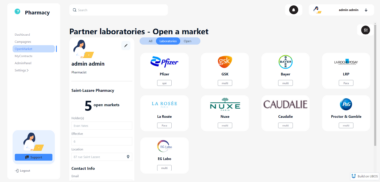Overview of Multi Database MCP Server
The Multi Database MCP Server is a groundbreaking solution designed to streamline the interaction between AI models and multiple databases. By implementing the Model Context Protocol (MCP), this server acts as a bridge, allowing AI assistants to execute SQL queries, manage transactions, and analyze performance across various database systems through a unified interface. Built on the robust FreePeak/cortex framework, it provides a standardized way for AI models to interact with multiple databases simultaneously, making it an indispensable tool for businesses aiming to leverage AI for data-driven decision-making.
Use Cases
Enterprise Data Management: Companies with diverse database systems can use the MCP Server to centralize access and management, enabling AI models to perform data analysis and generate insights without the need for multiple connectors.
AI-Powered Business Intelligence: By integrating with AI assistants, businesses can automate the generation of reports, perform complex queries across databases, and receive performance optimization suggestions, enhancing their business intelligence capabilities.
Development and Testing: Developers can use the MCP Server to test AI models in a multi-database environment, ensuring compatibility and performance across different systems.
Real-Time Data Analysis: With the ability to manage transactions and analyze query performance, the MCP Server is ideal for applications requiring real-time data analysis and decision-making.
Key Features
Simultaneous Multi-Database Support: Connect and interact with multiple MySQL and PostgreSQL databases concurrently, providing flexibility and scalability for enterprise applications.
Dynamic Tool Generation: Automatically generates specialized tools for each connected database, simplifying the process of executing queries and managing transactions.
Clean Architecture: Follows Clean Architecture principles, ensuring modularity and a clear separation of concerns, which aids in maintenance and scalability.
OpenAI Agents SDK Compatibility: Fully compatible with the OpenAI Agents SDK, allowing seamless integration with AI assistants for enhanced data interaction and processing.
Unified Interface: Provides consistent interaction patterns across different database types, reducing complexity and improving usability.
Comprehensive Feature Set: Includes capabilities for executing SQL queries, managing transactions, exploring schemas, and analyzing query performance, making it a comprehensive solution for database management.
UBOS Platform Integration
The MCP Server is a vital component of the UBOS Platform, a full-stack AI Agent Development Platform focused on bringing AI Agents to every business department. UBOS helps orchestrate AI Agents, connect them with enterprise data, and build custom AI Agents with your LLM model and Multi-Agent Systems. By integrating the MCP Server, UBOS enhances its ability to provide structured access to databases, enabling more powerful and efficient AI-driven solutions.
Future Roadmap
The roadmap for the MCP Server includes expanding support to additional database systems such as MongoDB, SQLite, MariaDB, Microsoft SQL Server, Oracle Database, Redis, Cassandra, Elasticsearch, CockroachDB, DynamoDB, Neo4j, and ClickHouse. This expansion will further solidify the MCP Server’s position as a versatile and essential tool for AI-driven database management.
Multi Database MCP Server
Project Details
- FreePeak/db-mcp-server
- MIT License
- Last Updated: 4/22/2025
Categories
Recomended MCP Servers
This template provides a streamlined foundation for building Model Context Protocol (MCP) servers in Python. It's designed to...
MCP server to connect to Oracle Database

story based implementation for sequential thinking
MCP Server for ServiceNow

MCP Server for Hackernews

Model Context Protocol (MCP) server for SonarQube
Giving Claude ability to run code with E2B via MCP (Model Context Protocol)
The (Unofficial) dubco-mcp-server enables AI assistants to manage Dub.co short links via the Model Context Protocol. It provides...
Expose llms-txt to IDEs for development

A Model Context Protocol (MCP) server that provides file system context to Large Language Models (LLMs). This server...
"primitive" RAG-like web search model context protocol (MCP) server that runs locally. 








